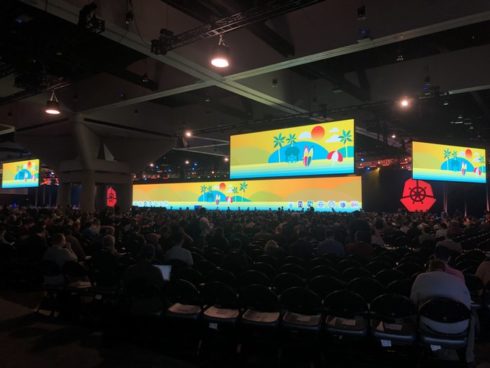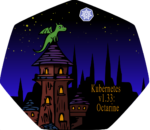
The second day of KubeCon is underway, and companies are still announcing new products or updates to existing solutions.
Here are some announcements that we made today:
Oracle announces new cloud-native solutions
Oracle has announced a number of new solutions and updates. It announced that on December 3, Apache Kafka will be compatible with Oracle Streaming. This will allow for use of the Kafka ecosystem along with the Kafka API, integration with Oracle Cloud Auth N and Auth Z, and reduced costs.
It also announced limited availability of Oracle API Gateway and Oracle Logging. Oracle API Gateway is a managed gateway that allows developers to create HTTP/S interfaces for other services. Oracle Logging is a single pane of glass for all logs. It allows companies to ingest and manage logs, then search and analyze them and take action.
RELATED CONTENT:
KubeCon Day 1: Gremlin’s chaos engineering solution, TrilioVault for Kubernetes, and HPE Container Platform
Rancher Labs’ K3s now generally available, Rio now in beta
Rancher Labs has announced that K3s is now generally available. K3s is a lightweight distribution platform for Kubernetes. According to Rancher Labs, K3s was designed for edge use cases.
The company also announced a beta release for Rio. Rio is an application deployment engine for Kubernetes. Rancher Labs believes Rio will address the complexity of building, deploying, and managing containerized on Kubernetes.
“The long-term viability and customer impact of Kubernetes is predicated on addressing the requirements of ITOps and DevOps teams alike,” said Sheng Liang, co-founder and CEO of Rancher Labs. “Our investments in K3s, Rio, and Rancher fill out our Kubernetes-as-a-service solution stack and demonstrate our ongoing commitment to cloud native innovation.”
Red Hat CodeReady Workspaces 2
Red Hat has announced a new version of CodeReady Workspaces, its solution for building applications in an environment that mirrors the production environment.
New features in CodeReady Workspaces 2 include air-gapped installs, an updated user interface, support for VSCode extensions, a shareable workspace configuration called Devfile, and production consistent containers for developers.
Portworx updates Portworx Enterprise
Portworx has announced the latest version of Portworx Enterprise. This update introduces backup and recovery and capacity management features.
“Digital transformation in the enterprise is increasingly driven by technologies like containers and Kubernetes. Together, these technologies help teams quickly deliver better services to their users and customers,” said Eric Han, vice president of product management of Portworx. “With these new capabilities, we are making good on our mission to provide full-stack support for running data-rich applications on Kubernetes so enterprises can reach their business transformation goals, all with cost-savings and compliance in mind.”
It introduces PX-Backup, which is a point-and-click backup solution for Kubernetes. It allows enterprises to manage, secure, protect, and backup data-rich applications running on Kubernetes.
It also added PX-Autopilot for Capacity Management, which intelligently provisions storage as it’s needed.
Mirantis launches a Kubernetes as a service solution
Mirantis has announced the beta for its Kubernetes as a service solution. The solution allows developers to create and manage Kubernetes clusters without having to manage a full stack of Kubernetes components.
Capabilities include the ability to consume Kubernetes on any public clouds and on-prem, create a consistent developer experience, enable application portability between clouds, and reduce the burden and cost of operating a fleet of Kubernetes clusters.
DigitalOcean has announced a new container registry and new 1-Click apps
According to DigitalOcean, the downside of using a free public container registry is that you could be making sensitive software public. The DigitalOcean Container Registry is simple, private, and secure, alleviating some of those concerns.
It also released 1-Click Apps for Kubernetes, which will allow customers to easily deploy software packages to Kubernetes clusters. The DigitalOcean Marketplace contains over a dozen 1-Click Apps for Kubernetes.
DataStax announces Kubernetes Operator
DataStax has announced a new operator for Kubernetes. This will allow organizations to more easily deploy and manage DataStax Enterprise (DSE) clusters on Kubernetes.
“As Kubernetes has matured, so has the tooling surrounding it. In this shift, deployment tools are evolving as well with operators for the deployment of containerized workloads both within user-facing applications and the databases that back them. The DataStax Kubernetes Operator handles this role for DSE by simplifying the process of deploying and managing clusters within k8s namespaces,” DataStax wrote in a post.
Instana now supports Rancher Kubernetes platform
Instana has announced support for the Rancher Kubernetes platform. This means that it will now detect, identify, and indicate Kubernetes clusters that are managed by Rancher.
“The deployment and management of applications continue to become more complex, especially when microservices apps are orchestrated via Kubernetes,” said Peter Abrams, COO and co-founder at Instana. “It’s critical for Application Management solutions like Instana to provide the most complete visibility into the structure of application infrastructure, while leveraging the observability built into those systems.”
xMatters updates workflow and incident management capabilities
xMatters has announced new capabilities designed to enable uninterrupted customer experiences. The new capabilities include a redesigned UI, product advancements in its visual workflow builder Flow Designer, automated workflows, and step-sharing capabilities for incident management.
“Every business today is digital and as a result, customer experience has become a key measure of any company’s digital transformation success,” said Troy McAlpin, CEO at xMatters. “The xMatters platform delivers embedded incident management natively into a software developer or reliability engineer’s workflow to equip them with the information they need and capabilities required to deliver uninterrupted customer experiences.”








